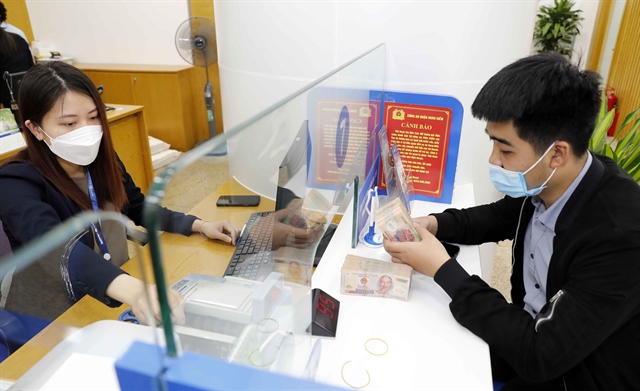 Business Beat
Business Beat


|
| A client borrows money from a bank in Hà Nội. — VNA/VNS Photo |
Compiled by Ly Ly Cao
HÀ NỘI — Since the beginning of the year, numerous banks have launched attractive credit packages with low interest rates, some even as low as 0 per cent per year, easing the financial burden for customers seeking additional capital, particularly during the time leading up to Tết (Lunar New Year holidays).
Lending interest rates are projected to continue decreasing in the near future, said experts. This is a promising sign that enables businesses and individuals to access capital at reasonable costs, supporting the recovery of production, business activities and consumption.
Tết is an occasion for businesses and individuals to supplement their capital for stockpiling goods, production, business activities and shopping. Recognising this demand, many banks continue to introduce credit packages with attractive interest rates.
Recently, Kienlongbank announced the implementation of the programme to support individual clients in promoting production, agricultural development, rural areas, and meeting the demand for consumer loans and lifestyle. Clients participating in this loan package will enjoy a preferential interest rate of 0 per cent in the first month.
Similarly, HDBank has also introduced a credit package worth VNĐ10 trillion (US$410.7 million) with a 0 per cent interest rate for the first month.
VNĐ5 trillion has been allocated for new individual borrowers or existing individual clients who wish to borrow additional funds, while the rest is allocated for small and medium-sized enterprises for salary and bonus payments at the end of the year. The interest rates for the remaining months will follow the current regulations of HDBank.
Although the 0 per cent rate only applies in the first month, this initiative is still a positive signal indicating that banks are actively reducing lending rates to stimulate credit demand.
Sacombank has recently increased its capital by up to VNĐ30 trillion for accelerating production and business activities of corporate customers, and allocated up to VNĐ45 trillion for lending to individual clients for both business and lifestyle purposes.
The bank applies interest rates for corporate loans starting from 3 per cent per annum for a 1-month term, 4 per cent per annum for a 2-month term, and gradually increasing to 5 per cent per annum for a 3-month term and 5.5 per cent per annum for a 4-12 month term.
For individual clients, the interest rates for business loans range from 6 per cent per annum for terms under 12 months to 7 per cent per annum for medium to long-term loans. The interest rates for personal loans start from 6.5 per cent per annum, with fixed rates available for 6, 12, or 24 months.
Similarly, BVBank has launched a lending programme for individual clients at the beginning of 2024, offering preferential interest rates starting from 5 per cent per annum.
The programme applies to new disbursals for purposes such as purchasing or renovating residential properties, personal consumption, or capital supplementation for production and business.
It also reduces the lending margin to 2 per cent per annum after the preferential interest rate period ends.
Previously, Nam Á Bank introduced a package of VNĐ1 trillion for individual clients seeking additional short-term business capital or issuing payment guarantees.
Customers can enjoy an additional interest rate reduction of up to 1.2 per cent by meeting certain conditions set by the bank.
Nam Á Bank also allocates VNĐ3 trillion in incentives for lending to businesses and individuals engaged in the seafood value chain, supporting customers in supplementing working capital for aquaculture, procurement, seafood processing, seafood feed and probiotics business.
In a recent report, KB Vietnam Securities JSC (KBSV) has predicted that the deposit interest rate environment will remain relatively stable at a low level throughout most of 2024. Specifically, the 12-month deposit interest rate is projected to range from 4.85 to 5.35 per cent per annum.
The latest update on deposit interest rates at banks as of the morning of February 1 showed that the trend of decreasing interest rates remains widespread across most banks.
At present, Agribank and Vietcombank are the two banks in the system that offer the lowest deposit mobilisation interest rates for terms below 12 months. For deposits with terms of 12 months or more, Vietcombank is currently offering an interest rate of 4.7 per cent per annum.
Regarding lending interest rates, KBSV suggests that the impact of maturity differentials and delayed interest rate reductions will likely be challenging to achieve significant decreases in lending rates.
KBSV believes that there is still potential for the average lending interest rate to decrease by an additional 0.75-1.0 percentage point in 2024.
SBV to keep rates stable
Meanwhile, United Overseas Bank (UOB) said that with the ongoing economic recovery and better prospects in 2024, the possibility of further interest rate cuts has diminished.
As a result, UOB experts believe that the SBV will maintain the existing refinancing rate at 4.50 per cent.
Rather than pursuing additional interest rate cuts that may face limitations due to the lower bound, the Government has shifted its focus towards non-interest rate measures to support the economy. One such measure involves prioritising credit accessibility for borrowers, according to UOB.
Another sign is the recent amendment to the Law on Credit Institutions, which will be effective from July 1, 2024. The amended law establishes a framework for special loans from the SBV, including interest-free loans and non-collateralised loans.
These provisions aim to support specific policy objectives, such as assisting critical sectors and enabling emergency liquidity operations when needed, such as in cases of mass withdrawals from banks.
Since the beginning of 2024, the State Bank of Vietnam (SBV) has fully allocated the 15 per cent credit growth target to commercial banks, aiming to boost capital flow into the economy and support the recovery of businesses' production and operations.
SBV has announced its continued guidance for credit institutions to prioritise lending to sectors involved in production, priority areas and growth drivers such as investment, consumption and exports, in accordance with the Government's policies. There will be strict control over credit allocation to sectors with potential risks.
On the other hand, credit institutions are required to create favourable conditions for businesses and individuals to access bank credit, and to promote the expansion of consumer credit alongside ensuring its safety and integrity. This will contribute to mitigating the prevalence of usury.
Deputy Governor of the SBV Đào Minh Tú said that the current lending interest rates have significantly dropped to a very low level, including both short-term and long-term rates, in both priority and non-priority sectors. The overall interest rate has reached its lowest point in the past two decades.
"Currently, there are still some high-interest rates remaining from previous periods when commercial banks mobilised funds at elevated rates," Tú said.
"However, it is certain that in 2024, these rates will no longer be maintained. In our management efforts, the SBV has no intention to increase interest rates in 2024." — VNS




